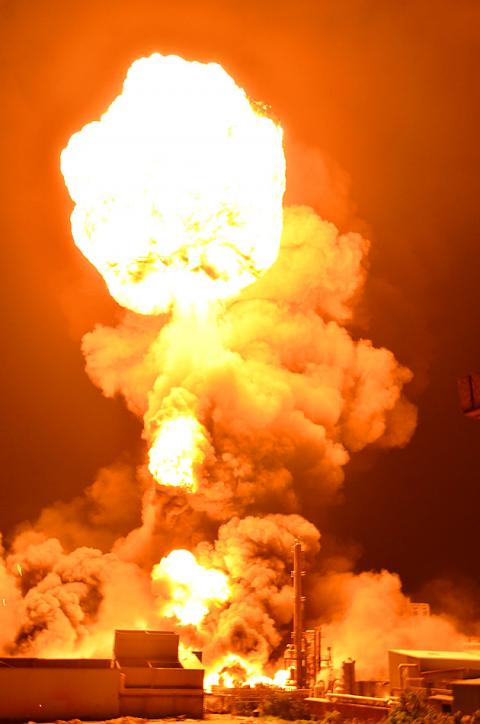A major explosion on Tuesday night burned down about half of a chemical plant in Lujhu Township (蘆竹), Taoyuan County, as firefighters battled the flames for more than five hours before bringing the blaze under control.
The fire started at the manufacturing complex of TNC Industrial Co (台硝化工公司).
As the inferno spread, it ignited spectacular fireball explosions, some as high as 10-story buildings. Fearing for their lives, many residents rushed out of their houses and ran to safety.

Photo: Chiu Yi-tung, Taipei Times
“The whole place was on fire and burning red hot. The flames kept getting higher and higher,” a resident said.
The fire became a major concern for the authorities as the plant is only 3km from Taiwan Taoyuan International Airport. Fortunately, no flights were affected, but the proximity of the plant allowed some flight passengers to capture the fire and the explosions on their cameras.
A total of 150 firefighters and 55 fire engines from 30 different units were dispatched to contain the blaze. It was eventually extinguished at about 4am yesterday.
A firefighting unit spokesperson said the fire likely started at a storage area, and as the plant produces nitrocellulose and other flammable materials, the flames quickly spread to engulf much of the facility.
A preliminary survey found that the fire and explosions had destroyed about half of the plant, with the cost of the damage put at about NT$15 million (US$500,000).
As the company had registered stockpiles of methyl isobutyl ketone and other toxic chemicals, the Taoyuan County Environmental Protection Bureau (EPB) sent its Hazardous Incident Response Unit to provide support.
The unit later reported air quality in the area was still within acceptable limits.
Another official said although half of the plant was destroyed, the rest of the facility was still operational. However, an investigation is to be conducted to determine if the company was at fault and if there are found to have been serious violations a shut-down order could be issued against TNC Industrial.

Intelligence agents have recorded 510,000 instances of “controversial information” being spread online by the Chinese Communist Party (CCP) so far this year, the National Security Bureau (NSB) said in a report yesterday, as it warned of artificial intelligence (AI) being employed to generate destabilizing misinformation. The bureau submitted a written report to the Legislative Yuan in preparation for National Security Bureau Director-General Tsai Ming-yen’s (蔡明彥) appearance before the Foreign Affairs and National Defense Committee today. The CCP has been using cognitive warfare to divide Taiwanese society by commenting on controversial issues such as Taiwan Semiconductor Manufacturing Co’s (TSMC, 台積電) investments in the

INVESTIGATION: The case is the latest instance of a DPP figure being implicated in an espionage network accused of allegedly leaking information to Chinese intelligence Democratic Progressive Party (DPP) member Ho Jen-chieh (何仁傑) was detained and held incommunicado yesterday on suspicion of spying for China during his tenure as assistant to then-minister of foreign affairs Joseph Wu (吳釗燮). The Taipei District Prosecutors’ Office said Ho was implicated during its investigation into alleged spying activities by former Presidential Office consultant Wu Shang-yu (吳尚雨). Prosecutors said there is reason to believe Ho breached the National Security Act (國家安全法) by leaking classified Ministry of Foreign Affairs information to Chinese intelligence. Following interrogation, prosecutors petitioned the Taipei District Court to detain Ho, citing concerns over potential collusion or tampering of evidence. The

‘COMPREHENSIVE PLAN’: Lin Chia-lung said that the government was ready to talk about a variety of issues, including investment in and purchases from the US The National Stabilization Fund (NSF) yesterday announced that it would step in to staunch stock market losses for the ninth time in the nation’s history. An NSF board meeting, originally scheduled for Monday next week, was moved to yesterday after stocks plummeted in the wake of US President Donald Trump’s announcement of 32 percent tariffs on Taiwan on Wednesday last week. Board members voted to support the stock market with the NT$500 billion (US$15.15 billion) fund, with injections of funds to begin as soon as today. The NSF in 2000 injected NT$120 billion to stabilize stocks, the most ever. The lowest amount it

NEGOTIATIONS: Taiwan has good relations with Washington and the outlook for the negotiations looks promising, Minister of Economic Affairs J.W. Kuo said Taiwan’s GDP growth this year is expected to decrease by 0.43 to 1.61 percentage points due to the effects of US tariffs, National Development Council (NDC) Minister Paul Liu (劉鏡清) said at a meeting of the legislature’s Economics Committee in Taipei yesterday, citing a preliminary estimate by a private research institution. Taiwan’s economy would be significantly affected by the 32 percent “reciprocal” tariffs slapped by the US, which took effect yesterday, Liu said, adding that GDP growth could fall below 3 percent and potentially even dip below 2 percent to 1.53 percent this year. The council has commissioned another institution